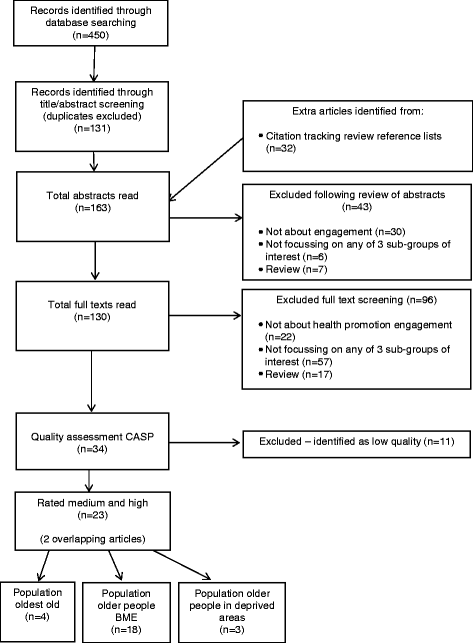Strategies to improve engagement of 'hard to reach' older people in research on health promotion: a systematic review
- PMID: 28431552
- PMCID: PMC5399821
- DOI: 10.1186/s12889-017-4241-8
Strategies to improve engagement of 'hard to reach' older people in research on health promotion: a systematic review
Abstract
Background: This systematic review aimed to identify facilitators, barriers and strategies for engaging 'hard to reach' older people in research on health promotion; the oldest old (≥80 years), older people from black and minority ethnic groups (BME) and older people living in deprived areas.
Methods: Eight databases were searched to identify eligible studies using quantitative, qualitative, and mixed research methods. Using elements of narrative synthesis, engagement strategies, and reported facilitators and barriers were identified, tabulated and analysed thematically for each of the three groups of older people.
Results: Twenty-three studies (3 with oldest-old, 16 with BME older people, 2 within deprived areas, 1 with both oldest-old and BME, 1 with both BME and deprived areas) were included. Methods included 10 quantitative studies (of which 1 was an RCT), 12 qualitative studies and one mixed-methods study. Facilitators for engaging the oldest old included gaining family support and having flexible sessions. Facilitators for BME groups included building trust through known professionals/community leaders, targeting personal interests, and addressing ethnic and cultural characteristics. Among older people in deprived areas, facilitators for engagement included encouragement by peers and providing refreshments. Across all groups, barriers for engagement were deteriorating health, having other priorities and lack of transport/inaccessibility. Feeling too tired and lacking support from family members were additional barriers for the oldest old. Similarly, feeling too tired and too old to participate in research on health promotion were reported by BME groups. Barriers for BME groups included lack of motivation and self-confidence, and cultural and language differences. Barriers identified in deprived areas included use of written recruitment materials. Strategies to successfully engage with the oldest old included home visits and professionals securing consent if needed. Strategies to engage older people from BME groups included developing community connections and organising social group sessions. Strategies to engage with older people in deprived areas included flexibility in timing and location of interventions.
Conclusions: This review identified facilitators, barriers and strategies for engaging 'hard to reach' older people in health promotion but research has been mainly descriptive and there was no high quality evidence on the effectiveness of different approaches.
Keywords: Ageing; Deprivation; Ethnicity; Health promotion; Inequalities; Older people; Oldest old.
Similar articles
-
Engaging 'hard to reach' groups in health promotion: the views of older people and professionals from a qualitative study in England.BMC Public Health. 2019 May 23;19(1):629. doi: 10.1186/s12889-019-6911-1. BMC Public Health. 2019. PMID: 31122239 Free PMC article.
-
Health and well-being promotion strategies for 'hard to reach' older people in England: a mapping exercise.Prim Health Care Res Dev. 2017 Nov;18(6):563-573. doi: 10.1017/S1463423617000378. Epub 2017 Jul 20. Prim Health Care Res Dev. 2017. PMID: 28724460
-
Impact of summer programmes on the outcomes of disadvantaged or 'at risk' young people: A systematic review.Campbell Syst Rev. 2024 Jun 13;20(2):e1406. doi: 10.1002/cl2.1406. eCollection 2024 Jun. Campbell Syst Rev. 2024. PMID: 38873396 Free PMC article. Review.
-
'Reaching the hard to reach'--lessons learned from the VCS (voluntary and community Sector). A qualitative study.BMC Health Serv Res. 2010 Apr 8;10:92. doi: 10.1186/1472-6963-10-92. BMC Health Serv Res. 2010. PMID: 20377850 Free PMC article.
-
Adapting health promotion interventions to meet the needs of ethnic minority groups: mixed-methods evidence synthesis.Health Technol Assess. 2012;16(44):1-469. doi: 10.3310/hta16440. Health Technol Assess. 2012. PMID: 23158845 Free PMC article. Review.
Cited by
-
General Practice and Digital Methods to Recruit Stroke Survivors to a Clinical Mobility Study: Comparative Analysis.J Med Internet Res. 2021 Oct 13;23(10):e28923. doi: 10.2196/28923. J Med Internet Res. 2021. PMID: 34643544 Free PMC article.
-
Is sports-branded screening effective in identifying adults at greatest risk of developing cardiovascular disease: a convergent parallel mixed-methods design to identify adults at greatest risk of developing cardiovascular disease using an opportunistic sports-branded health screening approach in the community.BMJ Open. 2025 Mar 26;15(3):e087974. doi: 10.1136/bmjopen-2024-087974. BMJ Open. 2025. PMID: 40139712 Free PMC article.
-
Older south Asian women sharing their perceptions of health and social care services and support: A participatory inquiry.Health Sci Rep. 2018 Jul 3;1(8):e55. doi: 10.1002/hsr2.55. eCollection 2018 Aug. Health Sci Rep. 2018. PMID: 30623091 Free PMC article.
-
Study protocol for a pragmatic cluster randomized controlled trial to improve dietary diversity and physical fitness among older people who live at home (the "ALAPAGE study").BMC Geriatr. 2022 Aug 4;22(1):643. doi: 10.1186/s12877-022-03260-8. BMC Geriatr. 2022. PMID: 35927684 Free PMC article.
-
Recruitment methods and yield rates for a multisite clinical trial exploring risk reduction for Alzheimer's disease (rrAD).Alzheimers Dement (N Y). 2023 Oct 14;9(4):e12422. doi: 10.1002/trc2.12422. eCollection 2023 Oct-Dec. Alzheimers Dement (N Y). 2023. PMID: 37841653 Free PMC article.
References
-
- WHO (World Health Organization) World report on ageing and health. Geneva: World Health Organization; 2015.
-
- Scrutton J, Sinclair D, Watson J, Hawkins M, Chong A.Public health responses to an ageing society - opportunities and challenges. http://www.cpa.org.uk/cpa-lga-evidence/ILC-UK/Scruttonetal,ILC-UK(2014)-.... Accessed 16 May 2016.
Publication types
MeSH terms
Grants and funding
LinkOut - more resources
Full Text Sources
Other Literature Sources


